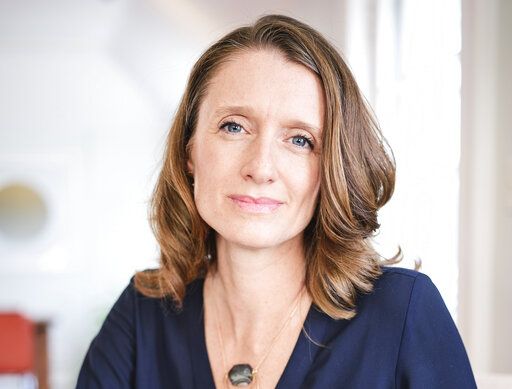Insider Q&A: Arjuna Capital’s Natasha Lamb
This photo provided by Arjuna Capital shows Natasha Lamb. Lamb is the co-founder and managing partner of the socially-minded investment firm Arjuna Capital .(Michael Prince/Arjuna Capital via AP)
MANCHESTER-BY-THE-SEA, Mass. (AP) — When highly profitable companies like Microsoft urge shareholders to reject an activist investor’s proposal to change corporate policy, investors almost always abide.
So it was a shock when nearly 78% of shareholders at Microsoft’s Nov. 30 annual meeting voted to demand more accountability from the company in responding to workplace sexual harassment complaints, including allegations involving co-founder Bill Gates.
Behind the winning proposal was Natasha Lamb, co-founder and managing partner of the socially-minded investment firm Arjuna Capital. Lamb talked with The Associated Press about Microsoft and investors’ growing interest in environmental, social and governance assets, known as ESG. The interview has been edited for length and clarity.
Q: Were you surprised at how many Microsoft investors supported this?
A: I was surprised. If you look at the history of Microsoft, there have been very few ESG proposals for one thing and very few high votes. What has changed, other than the Wall Street Journal breaking the storyon Bill Gates, is investors expressing concern not just about that, but about years of mismanagement on sexual harassment. Other investors are paying more attention. We had some large firms reach out to us about the proposal. And then, I have to wonder if Melinda French (Gates’ ex-wife and Microsoft shareholder) voted in favor.
Q: Was this more about Bill Gates or systemic issues?
A: There’s this reckoning with what’s happening systemically within companies and the culture that’s set from the top. The shift that’s happening from an investor perspective is saying this can no longer be in the shadows. And if you’re in Silicon Valley, if you’re anywhere right now, it’s a very competitive labor market. How are you attracting and retaining the best talent and moving them up the corporate ladder? If you are known for a culture of sexual harassment that is not dealt with in a transparent and accountable way, then that’s a big ding on your reputation.
Q: What are your most successful campaigns?
A: Microsoft is probably the most remarkable from a vote standpoint. But we pressed ExxonMobil to publish their first climate change report in 2014, making a case that there was material financial risk to unburnable fossil fuel assets sitting on their balance sheet that, in a low-carbon future, would become devalued and stranded. We’ve had a really groundbreaking campaign looking at racial and gender pay equity. We’ve pressed 22 Fortune 500 companies to report on their pay gaps and commit to close their pay gaps. We started in Silicon Valley and then we went to Wall Street, and then we branched out into big retailers like Amazon, Starbucks.
Q: What’s the hardest pushback you’ve had?
A: Exxon has been the most harrowing. Probably because of the trial ( prosecuted by New York’s attorney general over the costs of climate change, in which Lamb sat for hours of cross-examination). But I would say the most challenging company has been Facebook because of the structure of the company with Mark Zuckerberg as CEO, chair and controller of the vote with all the super-voting shares. What we’ve tried to do with Facebook is akin to if you have an asteroid that’s coming to the Earth. There’s two theories on how you can deal with it. You can hit it with a nuclear bomb and have all this nuclear fallout, or you can send up a satellite and throw it off course so it doesn’t hit the Earth. The role we have tried to play is trying to be that satellite and be annoying, and like, hey hey, do something different. But with that company it’s got to the point where the nuclear option is going to come.
Q: Who are your clients and what are they looking for?
A: The majority are high-net-worth individuals and families. We also manage money for some institutions, nonprofits. The activism is a big, big piece of what they’re hiring us for, as well as the ESG. They care about issues like climate change and social justice and good governance.
Q: Can you name any?
A: The Highlander Center down in Appalachia is a nonprofit institution that does research and education on social justice. We’ve worked with a lot of people in the music and entertainment industry. R.E.M., the Beastie Boys (on net neutrality), Krist Novoselic from Nirvana (on combatting social media misinformation). So we’ve got some cool kids in here.
Q: Where did the name Arjuna Capital come from?
A: Arjuna is this epic hero from the Mahabharata and the Bhagavad Gita. So it has Indian origins, and Arjuna is an archer, very skilled and beloved, and he is going into battle against this very morally complex landscape, which may sound familiar. I always say there’s no perfect publicly traded company. There’s gray areas. We’re not claiming moral purity, we’re engaging in the way that we think is best for our clients and best for the world. How can they use the power of their money to shift things for the better?
Q: How much of your time is on shareholder activism?
A: We get a lot of attention for our activism because we’ve been successful at it and to have more of a public profile there. But at the end of the day, we’re just a good investor. I’m a portfolio manager. I manage our stock strategy. I think one of the reasons we’ve been so successful on the activist side is because we’re bringing that investor lens. When we engage on issues we’re doing so from the perspective of it being accretive to returns.


